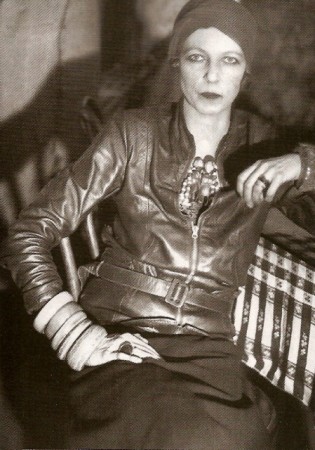Nancy Cunard (Liverpool)
By Hannah Brearton

“This woman has something I have never discovered in any other person… An invisible power.” These are words used to describe Nancy Cunard. Born into the upper class in 1898, Nancy was the sole heir to the Cunard Shipping business. The Cunard name is one synonymous across Merseyside. With the Cunard Building standing in the centre of the Liverpool Skyline, next to the Liver Building. Yet, Nancy’s name often goes unheard, despite the fact that her story is one that resonates with elements of global history.
So, describing a picture of Nancy:
“Hair fair. Blue eyes. Thin face and lips. Slim build. Dressed in red leather coat, with tight fitting hat to match. Dark grey woollen dress. Flesh coloured silk stockings. Lizard skin shoes.”
This description, taken from a police file, reflects Nancy’s artistic style. In her childhood Nancy lived the privileged and lavish life of the elite – frequently travelling, receiving a boarding school education and attending many extravagant parties.
However, what makes Nancy’s story different, was the life she chose to lead. Rejecting this world of wealth and privilege, ultimately earned her the title of the ‘rebellious heiress’ and her own police file. Nancy hosted her own type of parties, but with a greater purpose than entertainment. At these parties attended by intellectuals, artists and activists there would be talks given on various injustices and money raised to support causes.
Throughout her life Nancy chose to use the platform and status she was given through birth to, as some have put it, “put her money where her mouth was” advocating for racial equality, political freedom and human rights worldwide. Arguably, Nancy was a woman of our age 100 years earlier. Her unique life can provide wider insight into our global story. Through Nancy’s literal far reaching geographical impact to what her story can tell us about society's attitudes and culture.
It was in 1928 when Nancy met Henry Crowder an African American Jazz musician that she learnt of and subsequently became deeply interested in the American civil rights movement and wider fight for racial equality, which she helped bring to a global stage.
Their relationship was the source of much attention, becoming the focus of gossip pages. The Liverpool heiress directly addressed and attacked these racist attitudes, including her own mother’s, in the pamphlet ‘Black man and White Ladyship’.
Nancy continued to fight on racial injustice publishing the anthology called Negro in 1934. The collection contained outspoken criticism as well as providing a platform for African American writers to share their own poetry and short stories. Building upon the work she had already done, establishing the Hours press in 1928, which provided an outlet for new and upcoming voices, amplifying and widening global perspectives.
The collection gained attention before it was even first published due to its controversial nature, with Nancy being subjected to extensive hate. But this would not stop Nancy who, undeterred, actually published many of these threats within the anthology! This speaks volumes for Nancy’s unequivocal support and determination to speak out and highlight the issues she cared about, no matter the personal cost, which included being disinherited due to her relationship with Crowder.
Nancy understood that she could use her position in society, gained through her family’s Mersey shipping empire; to fight for racial equality, she can act as a symbol for this wider movement.
Nancy continued to address global injustices’, taking a stand against the growing fascist and right-wing movement that was taking grip over much of Europe. She wrote extensively on Mussolini's invasion of Ethiopia in 1935. Writing against the awful atrocities committed by Mussolini’s fascist regime.
Cunard also played her part in the opposition to the Spanish Civil war. As a freelance journalist she reported, raising awareness and depicting this part of our global story.
Nancy Cunard, the ‘rebellious’ Liverpool heiress used her Cunard name and influence to challenge societal attitudes, not just in Britain but across the globe. Whilst I have only been able to touch on some of Nancy’s achievements, I hope to have illustrated how her activism saw no borders. Nancy devoted her life to challenging racist and fascist beliefs as well as providing outlets to share ideas, widening our global perspectives.
Whilst Nancy died in 1965 arguably the things she stood for in her life still stand today.
Photo: Nancy Cunard, 1932 (author unknown), via Wikimedia Commons.

